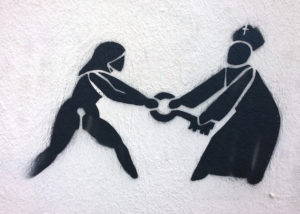 Abortion has never been a simple issue for me. I grew up in a Catholic family, but no one ever said anything about it. There wasn’t enough discussion about this controversial issue to guide my thinking in any particular direction. It wasn’t until high school that a friend framed the issue as one of women’s rights, and suggested that a woman should have autonomy over her own body. Once she had pointed it out, it seemed obvious to me. Of course women should be able to decide for themselves. It’s their body. But the idea of having to get an abortion felt like such a sad reality that I never wanted to think about.
Abortion has never been a simple issue for me. I grew up in a Catholic family, but no one ever said anything about it. There wasn’t enough discussion about this controversial issue to guide my thinking in any particular direction. It wasn’t until high school that a friend framed the issue as one of women’s rights, and suggested that a woman should have autonomy over her own body. Once she had pointed it out, it seemed obvious to me. Of course women should be able to decide for themselves. It’s their body. But the idea of having to get an abortion felt like such a sad reality that I never wanted to think about.
I happen to be in a position where pregnancy is not something I have to worry about. My birth control is covered under my state-funded health insurance, and I attend a university where condoms and sex education are readily available for students who need them. Not to mention the fact that as a bisexual woman, sex that may result in pregnancy is not the only option for me. But if I were to become pregnant at this current stage of my life, when I don’t have the emotional or financial resources to give a child the life it needs, abortion would seem like the best option.
But just because it’s the option that makes the most sense for who I am doesn’t mean I would take it lightly. If I were in that position, I can’t imagine the sadness and grief I would feel, not to mention the guilt, over not being able to bring a child into the world and provide a happy home and a good life. I think it would feel like a loss. A big part of my believes that it is one. My feelings about abortion are not simple. It does seem like ending a life to me, even though the definitions are conflicting and unclear. But I would never try and convince another woman to make a different decision.
We can recognize that abortion is often hard, and sad, and a difficult decision, without trying to shame people who find themselves needing one. We can grieve the loss of fetuses that might have become children without judging the people who were unable to bring them into the world.
Many women don’t have the kind of options that I have. While I don’t at all feel ready for a child, I do have some capital to fall back on. I have a high school diploma. I have a work history that includes being paid more than the minimum wage. I have friends and family who could help me with child care. I have health insurance. I live in an area with free public transportation. I have a modest amount of savings. I’m white and cisgender, which would make it easier for me to get and keep a job, not to mention things like changing diapers in a public restroom.
There are also options I don’t have. Publicly funded child care is slim in North Carolina. I don’t yet have a college degree, and I have a lot of student loans that would need to get paid in addition to the costs of a child. The savings that I have now wouldn’t last two months paying for a baby. I don’t currently have a full-time job. My family does not have money that they could use to help me take care of a child. I have no safety net.
The factors that go into the decision of whether or not to have a child are vast and varied. No one has the right answer. Each person who becomes pregnant has a decision to make. We can allow space for each of those people who feel sad over something as heavy as an abortion without trying to keep them from making that decision. It’s hard enough to admit that you’re not capable of having a child, especially in a world that tries so hard to convince women that’s all they’re good for. We don’t also need to tell women they’re murderers for doing what’s best for them.

Thanks for sharing this perspective Olivia!